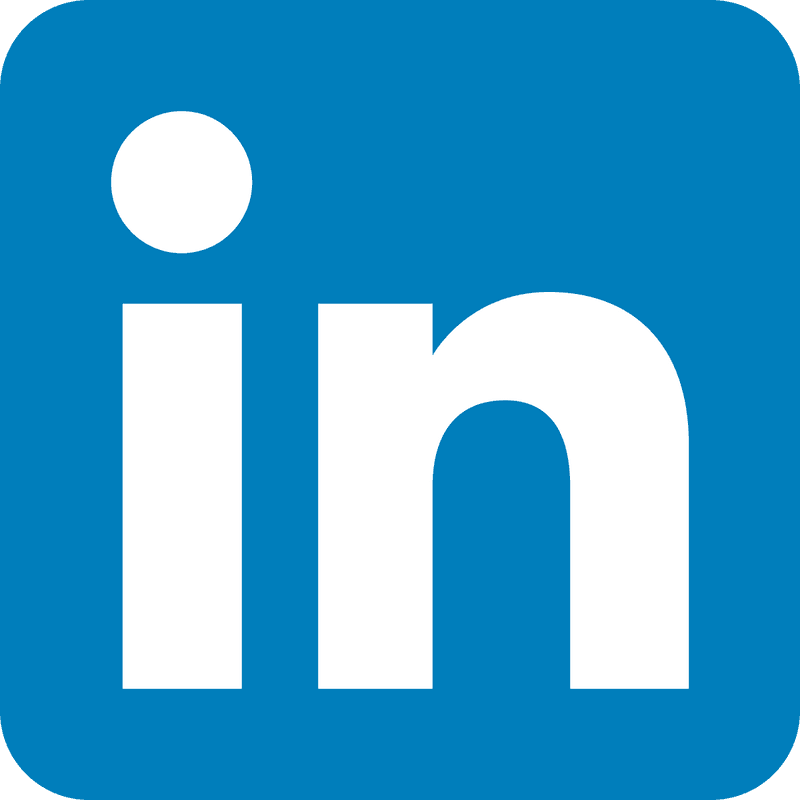11 Cold Call Statistics To Increase Your Sales Numbers In 2024

Introduction
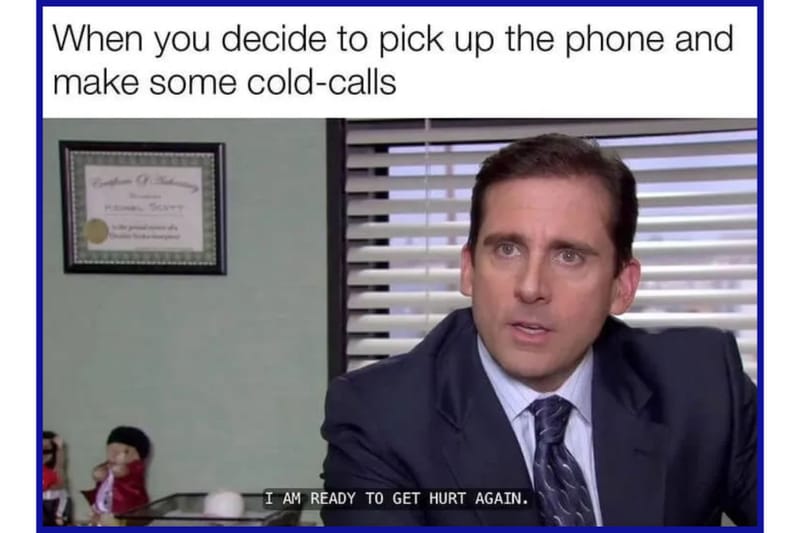
The Office, anyone?
Cold Calling is not going anywhere when it comes to sales.
You will see multiple articles talking about the dying trend, which is cold calling, but that's not the case.
Don't believe me?
How about a report, which states that cold calling is the most preferred mode of communication for businesses to close sales?
You will need to download the report by giving your information, so I'll just give you the TL;DR -
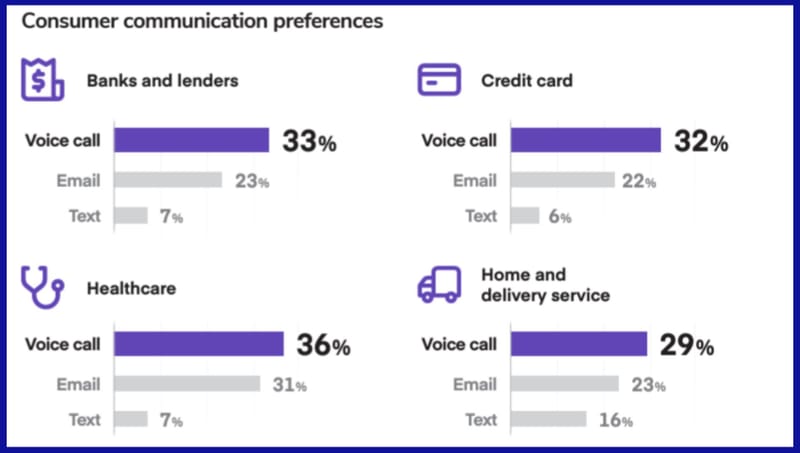
(Image Source: Hiya.com)
This report is based on a survey conducted on more than 12000 consumers.
The graph shows that even in 2024, consumers prefer to use voice calls over any other form of communication. And when it comes to sales, 66% of companies mentioned that voice calls are essential or very important.
While this strengthens the statement I made, there is a growing outlier that we'll discuss at the end.
What is Cold Calling?
If you are new to sales, this is one of the first things you'll learn.
Cold calling is a sales technique in which a salesperson contacts potential customers who have not previously expressed interest in the products or services being offered over the phone.
The key point is that these potential customers, often called "prospects," are not expecting the call.
I'm sure someone in your contacts, if not you, has received a call from sales once in their lifetime. Getting a call from sales is inevitable.
Yes, you can take precautionary measures, but somewhere, someone will sell your information to a sales company, and they will call you.
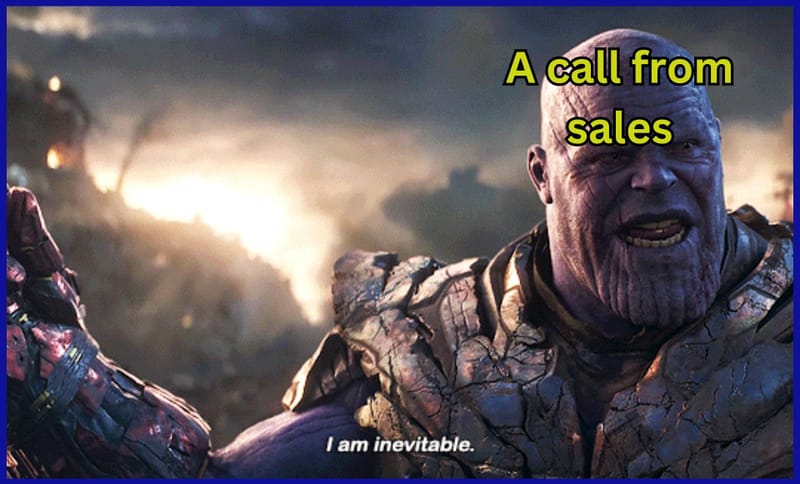
Why is it Called "Cold" Calling?
It's called "cold" because there is no prior relationship or warm connection between the salesperson and the prospect.
The prospect isn't warmed up or prepared for the call, which is why the approach can feel "cold" or unexpected to them.
Think of it as a surprise attack!
The top Cold Calling statistics
Knowing when to call
You might have heard or read the saying, "There's a right time for everything."
If not, you have now.
The saying extends to sales as well. When in sales, you should not call the prospect without knowing what the best time of the week to call is!
In a survey conducted by the people over CallHippo, it was found that:
- You should avoid calling your prospects on a Monday and the second half of Friday,
- The best day to call is Wednesday as it is the middle of the week and workwise neutral for most working people
- The worst time to call a prospect is during lunch hours
- The best time to call a prospect is from 4:00 to 5:00 pm, or you can try to contact them right before their lunchtime. i.e. 11:00 am to 12:00 pm
This survey was conducted for over 30 weeks across 15+ countries and over 1200 clients. So, the data is very robust.
Accepting Rejection
A time comes in everyone's lives when they must face rejection.
Whether it's a job interview or someone that you like, rejection is a part of almost every person in the world. And this extends to the world of sales as well.
When picking up the phone to attempt a cold call, you should remember that you are very likely to be rejected.
Why is that?
Well, there are a couple of reasons, but the biggest one by far is -
Spam Calling
In the last few years, the number of spam callers has gone drastically up. Let's review some numbers.
According to research, U.S. citizens reported the highest rate of unwanted calls, at 8 per week.
In 2023, out of the 46.75 billion unknown calls, 28% were spam or fraud calls.
With the rise of apps that block this kind of calls, the situation has slowed down from worsening further, but when asked if they are willing to pay extra for better protection, 59% of U.S. citizens chose to stay unprotected from such calls.
Don't do that.
Instead of losing a lot of money to fraud or spam callers, you should invest a small amount in preventing such calls from reaching you.
Research your prospects
While the person receiving the call might not know you, it is your duty to learn everything there is to know about the person you are about to call.
Researching the market is the best way to ensure that you make the maximum number of sales.
When you do your market research, these are the things that you will be able to answer -
- Who are they?
- Where are they?
- What are their needs and desires?
- What do they like to buy?
Adequate information about the prospect will help you understand their needs and subsequently allow you to formulate a sales pitch centered on them.
But be warned, researching your prospect doesn't mean you should go ahead and become a PI (Private Investigator). Do not get too personal with them!
That being said, you will need to find a middle ground. You want to be friendly enough that when you suggest your sale, they ponder it for a minute but not so friendly that it creeps them out.
Maximum number of calls in a day
In B2B sales, the average number of calls a sales representative should make is 60.
If the number seems high to you, that's because the success rate of cold calling is quite low when compared to the actual number of calls a sales representative has to make. Some even block the number.
According to the study, while the average number of calls in a day should be 60, it was found that it averaged around 35.
Now, let's do some math:
Another study shows that, on average, it takes about 8 calls to reach a prospect, which means if there are 60 calls made in a day, and 300 calls in a week, you will be able to reach about 38 prospects in a week.
There are many nuances involved. Hence, the numbers are estimates and do not hold true for every sales team or company.
Expect Objections
When cold calling, you need to be aware that the prospect, if interested, will have some questions that you need to answer confidently. Your answer should be on point and clear their doubts.
A study has found that in successful sales calls, the sales professionals usually do more talking than the prospect. The numbers are 55% to 45% for sales professionals to prospect, respectively.
When you talk, be articulate and to the point. Using inclusive phrases like "we" or "our" will increase the chances of booking meetings with prospects.
Be respectful and mindful of their time. If they are unable to take the call immediately, ask them for a time when you can connect again. Or ask them if you can call after 1 or 2 hrs.
This way, you don't invade their time, and they'll keep your appointment in mind.
Write a cold calling script beforehand
This applies to people who are just starting their sales careers.
Even after you have been briefed a couple of times, the first call is always the hardest. In such cases, having the sales script ready by your side is of immense help.
I don't say read the script word for word like a robot.
No.
But write down some points or lines that you can just glance at to remember what you had to say. This is a much better strategy than just blabbering or stumbling upon your words.
Voice Mails
Let's be real. Most people do not use voicemails anymore. In the age of text messaging, leaving a voicemail is a dying tradition.
Of course, the numbers are not completely null. According to a survey, about 80% of the total calls went to voicemail in 2023.
Whether or not those voicemails were heard is a different story. In fact, some businesses now experiment with quicker alternatives such as flash call authentication, which makes the process faster and less intrusive than leaving long voice messages.
If you, as a sales rep, want to use voicemail, you need to have an effective sales pitch ready to go. The average time a person listens to a voicemail (apart from emergencies) is 8-13 seconds!
This is in addition to the fact that only 20% of the voicemails will ever be received, so it's all the more important that you make use of this time.
All in all, this is one of those tactics that won't completely die because there will always be prospects you can turn in!
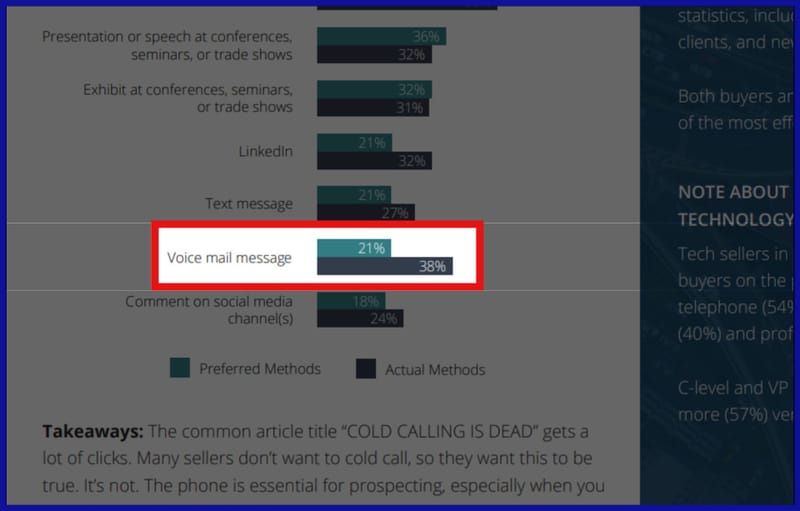
(PDF screenshot of the research by RAIN group)
Follow-up Call
When it comes to a successful cold call, you cannot just call your prospects once. You need to keep the conversation going and keep them engaged.
This keeps the prospect in the loop, which in turn increases the chances of a successful deal.
I have a study to back this up. It shows that about 80% of the successful sales have required an average of five follow-ups.
(Screenshot of the article below)
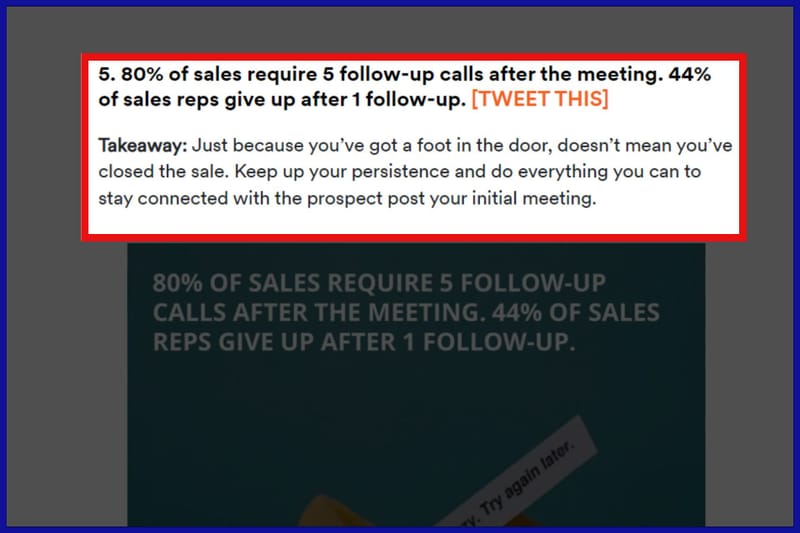
Greeting
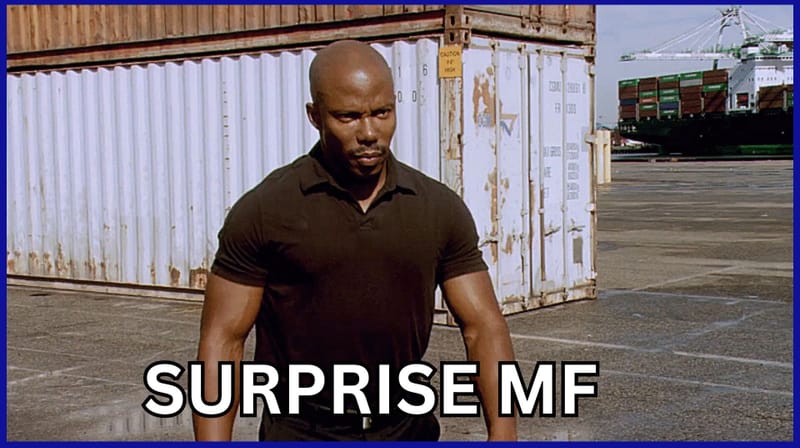
Not like this.
Yes!
The way you greet a prospect on call plays an important role when it comes to making cold calls.
For the longest time, opening your sales with "Did I catch you at a bad time?" was considered to be the best way. It was believed that the dialogue subconsciously tells the brain that they are in control (the prospect), because if they say no, then the sales rep has to disconnect.
But, when this theory was put to the test, the reports came out quite the opposite!
A survey conducted by the good people at GONG (from whom I'll graciously borrow the data) shows that opening with that line increases the chance of dismissal by 40%.
40%!
This decrease is due to the newer generation's impatience. This opening line was useful when cell phones were the majority's preferred mode of communication. Now, people want to be contacted through text messages or email.
On the other hand, asking, "How've you been?" is the opening line you should be going with. It has a 6.6x higher success rate compared to the baseline greeting. (Check the survey)
Learn to keep the right tone

Fine, I'll watch WOTWS, again.
If there's one thing you need to know when cold calling, it's that the prospects will have doubts.
Doubts that you have to clear.
Now, these doubts can be in the form of anything. Maybe they are hesitant regarding your sales pitch, maybe they had a bad experience prior to you, or maybe they have heard from others that salespeople are evil, and you need to make them understand that's not the case.
According to a survey, the sales reps with the highest success rate take a long pause before replying to any doubts they have. In contrast, the more unsuccessful ones tend to cut off the prospect in the middle of their query in order to reply.
Don't do that.
Keeping a confident tone is key. When the prospect listens to you talk, they should feel as if it's coming from a place of authority. They should feel as if you speak only in facts and nothing else. Facts the prospects cannot deny.
Even in the harshest scenario, you should not lose your tone. But beware, in hopes of keeping the same tone, you might end up sounding like a robot.
You can practice how you approach a prospect's doubts by writing them down. Because writing brings out the more aristocratic you.
Make small talks
Your main objective when cold calling is to sell the meeting. All the important information will be discussed in the meeting.
But to get to that point, you need to make the conversation interesting and engaging.
This is where small talks come in. It might not seem like the best route to take, especially in sales, where getting to the point is your main objective, but making small talk is very important.
For example, a survey reveals that the more interaction the sales reps have with their prospects, the higher the chance of a cold call success.
This is one of those sales process that you have to be good at from the get go, or else, it'll take you a while to get the hang of.
Small talk seems simple at first, but it is the base on which the building of your sales will be built. The chances of closing the deal increase when you go back and forth in your conversation, giving it a natural flow.
Endgame
If you've made it this far, congratulations!
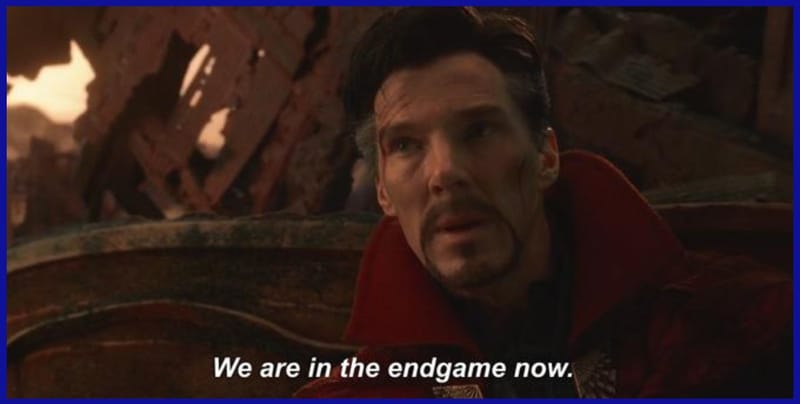
Yeah, that's all I have to say. If you think you can become the best sales rep ever just by reading, then I have some news for you, buddy.
The points I've discussed so far have all been conclusively proven through surveys, so you can proceed with 100% certainty that these statistics will help you increase your cold-call success rate.

